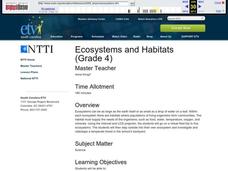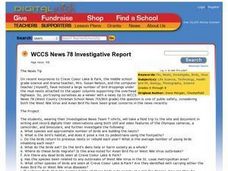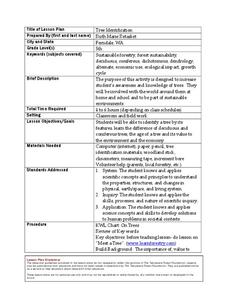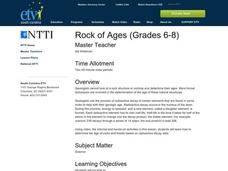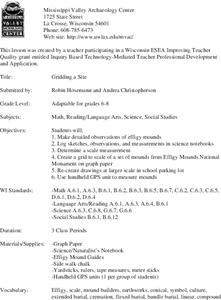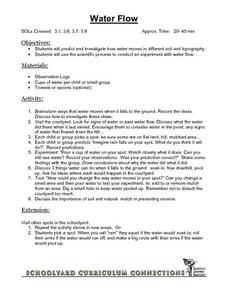Curated OER
Ecosystems and Habitats
Fourth graders go on a virtual field trip to five ecosystems. They investigate and videotape a temperate forest in the school's backyard.
Curated OER
WCCS News 78 Investigative Report
Students role play the role of investigative reporters. In groups, they determine what type of bird is leaving its droppings on the overhead highway beams. They answer a given set of questions and present their conclusions to the class....
Curated OER
Tree Identification
Students list four ways to identify trees. In this tree identification instructional activity, students use tree identification techniques such as leafs, bark, wood grain, soil type, and climate to create tables and graphs.
Curated OER
WONDERFUL, WATERFUL WETLANDS
Students list characteristics of wetland and describe the functions of a wetland.
Curated OER
Rock of Ages
Students use a video, the Internet and hands-on activities to explore how to determine the age of rocks and fossils based on radioactive decay data.
Curated OER
Earth Matters
Students identify Earth's equator, prime meridian, lines of latitude, lines of longitude, parallels, and meridians.
Curated OER
Centipede or Millipede?
Students discuss millipedes and centipedes in terms of their classification as arthropod. Using a diagram, students categorize and compare and contrast the characteristics of millipedes and centipedes based on their discussion of...
Curated OER
Life Cycle of the Butterfly
Students investigate the life cycle of butterflies. In this butterfly lesson, students record the life cycle of a butterfly using digital cameras. Students make digital books or slide shows at the end of the project.
Curated OER
Density
Students explore the meaning of density. In this density instructional activity, students use interactive whiteboards to review definitions regarding density and compare the density of selected objects.
Curated OER
Wild Flower Project
Students photograph as many different kinds of wild flowers that they see around their school. In this wild flower lesson plan, students take different pictures of wild flowers after identifying their characteristics and coming up with a...
Curated OER
Understanding Interactions Among Local Species and the Local Environment
Students examine the differences between biotic and abiotic factors, explain the difference between habitat and niche and compare how organisms get their nutritional needs. In this local environment activity students trace the path of...
Curated OER
Classify Forces
Third graders compare and contrast the forces of pushing and pulling. As a class, they take a field trip around the school and write down any action they see and any object that is motionless. In groups, they use magazines to cut out...
Curated OER
Spider Webs
Learners create spider webs. In this spider webs lesson, students research various types of spider webs then write a report about a spider of their choice. Learners also make their own web similar to an orb spider.
Curated OER
Gridding a Site
Learners make observations of effigy mounds and record them in a notebook. In groups, they must determine the scale of measurement and create their own grid to scale part of the Effigy Mounds National Monument. They also practice using...
Curated OER
Environment: Water Flow
Students brainstorm the ways that water flows when it falls to the ground. After discussing three things water can do, they investigate and predict water movement outdoors on school grounds. They experiment ways to alter the water flow...
Curated OER
It's Fun to Learn!
Students use the macro mode of the OLYMPUS FE-140 CAMERAS as virtual microscopes to explore different habitats, observe plants, soil, and insects and other creatures. They download those images on electronic files and build web pages....
Curated OER
Loading B&W Film
Ninth graders explore how to properly load black and white film. They observe black and white film being loaded into the developing tank and students correctly load the film into the developing tank.
Curated OER
Comparing Cities
Students research the characteristics of cities in two different geographical areas. Using the internet, they take notes on the information they collect and record their observations on the two cities. They discover how the location...
Curated OER
Life on the Edge
Students participate in a variety of activities about endangered animals. They read books, watch videos, and, in pairs, choose an endangered animal to research. They create a 2 slide presentation to be compiled into a class slide show.
Curated OER
Cruise Conditions Graphing & Statistics
Students monitor weather conditions for an eighteen day period at a specific location. The temperature of both air and water is taken and the mean, median, and mode calculated. Differences between the highest and lowest recordings are made.
Curated OER
Texas Estuary Project
Students practice the proper lab techniques of coring, seining, taking temperatures, and salinity. Students analyze and graph data. Students write a 3 part essay and correctly draw and label a food web of their field site.
Curated OER
Magnetic Attraction
Second graders create a hypothesis on what objects will attract to magnets. In this magnets lesson plan, 2nd graders use a computer program to create a hypothesis as to what will attract or unattract magnets. For an extension, they test...
Curated OER
What Do I See Now When I Picture Saturn?
Students complete their study of Saturn and its moons. They reflect in writing what they have gathered from the lessons. They draw pictures and add captions to them. They share their work with the class.
Curated OER
Nuclear Reactors
In this nuclear reactors worksheet, students use a diagram to match 28 words into a paragraph describing the parts of a nuclear reactor and what job they perform.


